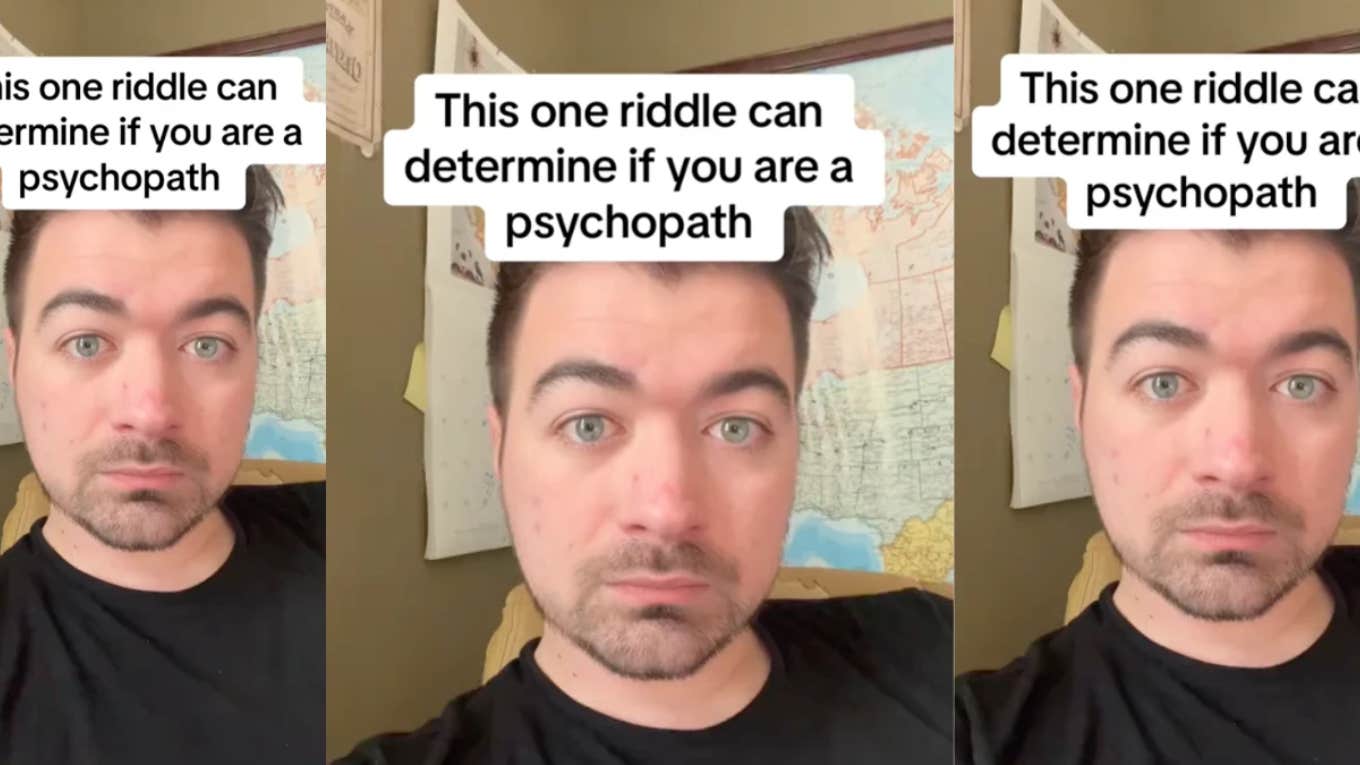Diagnosed Narcissist Shares The Riddle That Can Allegedly Determine If You're A Psychopath
The riddle is more of a thought experiment than any legitimate clinical tool.
 @thenamelessnarcissist / TikTok
@thenamelessnarcissist / TikTok Personality disorders are a particularly complex part of the Diagnostic and Statistical Manual of Mental Disorders, or DSM, published by the American Psychiatric Association. While it’s become fairly common to hear clinical terms related to personality disorders pitched around TikTok and Instagram, not everyone wielding the terms is doing so in the correct context.
A diagnosed narcissist shared a riddle that can allegedly determine if you’re a psychopath.
Jacob Skidmore posts on TikTok under the username “The Nameless Narcissist.” He uses his clinical diagnosis of Narcissistic Personality Disorder as an entry point to creating content about the various nuances of narcissism. He explains how he enters and experiences the world, focusing mostly on how his diagnosis affects his ability to maintain relationships.
Skidmore filmed himself sitting in a beige room, sparsely decorated with a map on one wall and a calendar on the other. In the TikTok post, he proclaimed, “If you can answer this riddle correctly, then it is a major sign that you're a psychopath.”
He offered a caveat about the nature of the riddle, noting that “there’s no research to validate it.” Still, Skidmore said, “If you do get it right, don’t get all in a panic. However, that being said, the only people in my life who are accurately able to answer was me, a diagnosed narcissist, and my sister who is diagnosed with ASPD, aka sociopathy. So, take that as you will.”
“So, a woman goes to her mother’s funeral, and she meets a guy there that she’s never met before and they really hit it off,” he introduced the riddle. “Like, this woman is thinking, ‘Oh my gosh, this might be my soulmate.’ But she doesn’t realize until the funeral is over that she forgot his name, forgot his number. She has no idea who this guy is, and whoever she asks, they don’t know either.”
“The next week, she murders her sister,” he proclaimed. “So the riddle is, why did she do it? Why did she murder her sister?”
He offered up the answer to the riddle, saying, “Because if she murders her sister, given that the sister and mother are related, there’s a good probability that that man will also show up to this funeral.”
Skidmore went on to clarify that the answer seemed obvious to him and he was able to answer quickly. He mentioned that his sister, who he claimed has a diagnosis of Antisocial Personality Disorder, “answered it really slowly because she thought it was a trick question because she found it so obvious.”
He clarifies that according to his perspective, the woman in the riddle doesn’t seem particularly psychopathic, stating, “It sounds more Machiavellian traits rather than psychopathic ones. But still, I think it’s a fun little riddle.”
Being able to answer the riddle isn’t a diagnosis in any form.
The riddle is more of a thought experiment than any legitimate clinical tool.
A majority of the comments on the post proclaimed the riddle’s answer obvious, as most people came to the same conclusion, that the woman killed her sister in hopes that the mysterious man would come to her funeral.
“Oh, we’re thinking in realistic terms?” Someone asked. “I was like, ‘the man is death.’”
“I immediately said to see the guy again,” one woman explained. “But I feel like this just indicates good logic skills. Because knowing the answer doesn’t mean thinking it’s moral.”
Her comment on the morality politics of the riddle raises a valuable point, one that touches on the issues of empathy and psychopathy. An article published in March 2022 by the American Psychological Association noted that various aspects of psychopathy include “low empathy and remorse, grandiosity, impulsivity, and sometimes aggressive or violent behavior.”
In the article, the APA stated that “about 1.2% of U.S. adult men and 0.3% to 0.7% of U.S. adult women are considered to have clinically significant levels of psychopathic traits.” They explained that “psychopathy is not a diagnostic category” within the current DSM, having been “replaced in the third edition by antisocial personality disorder (ASPD), which focuses mainly on the behavioral aspects of psychopathy, such as aggression, impulsivity, and violations of others’ rights.”
There are significant social and cultural stigmas held against psychopathy as a concept and diagnosis. Some clinicians believe that psychopathy exists along a spectrum. While not everyone in the mental health community agrees with that assessment, most do agree that “the area tends to be both underfunded and undertreated,” and ultimately, not fully understood.
Alexandra Blogier is a writer on YourTango's news and entertainment team. She covers mental health, pop culture analysis and all things to do with the entertainment industry.

